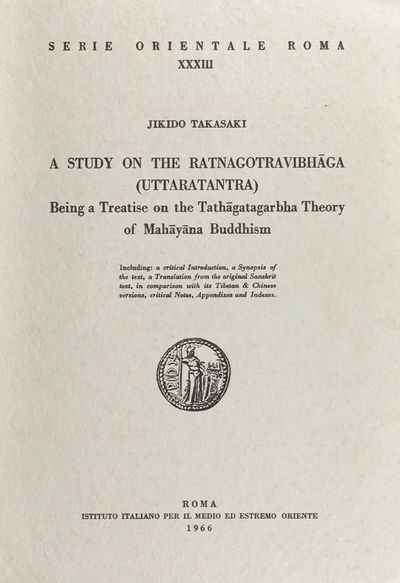- List of Abbreviationsix
- Prefacexi
- Introduction1
- I. The Ratnagotravibhāga, its Text, Translation, and Traditions concering the Author5
- 1. Text5
- 2. Translations & Traditions concerning the Author6
- II. The Structure of the Text10
- 1. Basic Text and Commentary10
- 2. Chinese Account of the Basic Verses12
- 3. Supposed Form of the Original Text18
- 4. The Commentary and Later Additions19
- III. Keypoint of the Discourse20
- 1. Ratnagotra, the Germ of the Three Jewels20
- 2. 4 Aspects of the Germ23
- 3. The Absolute26
- IV. Genealogy of the Tathāgatagarbha Theory32
- 1. Sources of the Ratnagotravibhāga32
- 2. Cittaprakrti and Āganutukakleśa34
- 3. Buddhajñana in the Avatamsaka35
- 4. The Tathāgatagarbhasūtra36
- 5. The Āryaśrīmālāsūtra37
- 6. The Anūnatvâpūrnatvanirdeśa and the Mahāparinirvānasūtra39
- 7. The Mahāyānasūtrâlankāra40
- V. Works on the Tathāgatagarbha Theory Contemporary with or Succeeding
the Ratna.45- 1. The Mahāyanadharmadhātvaviśesaśāstra45
- 2. The Buddhagotraśastra47
- 3. The Anuttarâśrayasūtra49
- 4. The Lankāvatāra and the Mahāyānaśraddhôtpādaśāstra53
- VI. The Position of the Ratna. in Mahāyāna Buddhism54
- 1. The Ratna. as a Criticism on the Prajñāpāramitā54
- 2. The Ratna. and the Vijñānavāda57
- 3. Consideration on the Date and Authorship of the Ratna.61
- I. The Ratnagotravibhāga, its Text, Translation, and Traditions concering the Author5
- Synopsis of the Text63
- Translation and Notes135
- I. Introduction141
- 1) The Meaning of the Adamantine Subjects141
- 2) Authorities on the 7 Subjects 143
- 3) The Essential Character of the 7 Subjects146
- 4) The Inherent Connection among the 7 Subjects153
- II. The Jewel of the Buddha155
- 1) The eightfold Quality of the Buddhahood156
- 2) Reference to the Jñānâlokâlaṅkārasūtra159
- III. The Jewel of the Doctrine163
- 1) The Eightfold Quality of the Doctrine164
- 2) Nirodhasatya & Märgasatya165
- 3) The Doctrine as the Truth of Extinction165
- 4) The Doctrine as the Truth of Path168
- Appendixes
- I. Supposed for of the Original Śloka-grantha393
- II. Corrections & Emendations to the Sanskrit Text396
- III. Description of the Ultimate Reality by Means of the Six Categories400
- Indexes
- 1. Index of Sanskrit Terms411
- 2. Index of Works, Authors & Schools437


